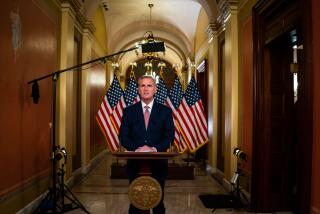Press Reported as Ready to Abandon Race for U.S. Senate
- Share via
Unable to raise enough money to compete effectively in a major statewide race, U.S. Senate candidate Bill Press is on the verge of withdrawing from the Democratic primary, according to friends and advisers.
Press’ withdrawal will free the party’s leading candidate, Lt. Gov. Leo T. McCarthy, to gird for battle against a Republican incumbent, Sen. Pete Wilson, who enters the race with considerably more money than McCarthy.
Press had hoped to mount an insurgent campaign that would excite the party’s liberal wing. But he failed to generate significant support, even after his dramatic and successful effort in January to negotiate the release of an American held in a Nicaraguan jail.
As late as last week, public opinion polls showed Press trailing McCarthy by 60 points.
Press, who is 47, has not held an elective office but is not new to politics. He headed the state’s office of planning and research under former Gov. Edmund G. Brown Jr. and ran an unsuccessful campaign in 1980 to make oil companies pay for mass transit improvements.
Most recently, Press worked as a political commentator for KABC television in Los Angeles.
Press would not confirm that he is quitting the race, but his staff cancelled a number of campaign kickoff events scheduled for Thursday and Friday and, in their place, announced that Press will hold two news conferences with McCarthy today in San Francisco and Los Angeles.
Meanwhile, three of Press’ political advisers said Tuesday that Press had told them that he is withdrawing.
“It was just an impossibility for Bill,” said one adviser who asked not to be named. “Leo (McCarthy) got everybody committed to him. Everybody was saying it’s Leo’s turn, even if he is not the most exciting candidate in the world.”
“I think Bill (Press) could not put together the kind of campaign financing he needed. He needed a million to a million and a half, and it just wasn’t there,” said Sidney Galanty, a political consultant who has been working with the Press campaign.
Campaign finance reports indicated that Press raised $230,000 in 1987 compared to McCarthy’s $1.5 million and Wilson’s $3.4 million. Press had insisted that he was better off than the spending reports indicated because much of McCarthy’s money was spent or obligated to the general election.
Nevertheless, his advisers said, Press would have had to borrow heavily to stay competitive in the race and that from a personal financial perspective, the decision to get out of the race was a wise one.
“I think he made a very realistic decision,” said Lucian Haas, an adviser with a long career of working for Democratic candidates, including California Sen. Alan Cranston and former South Dakota Sen. George McGovern.
But Haas said that Press’ departure leaves the Democrats without a candidate interested in reuniting the party with its true constituents, namely poor people and minorities.
“I don’t see anyone prepared to take the party back to the Mexican community, or the black community or to any of the inner-city neighborhoods where its roots are,” Haas said.
He was particularly contemptuous of the state party’s decision to hold its upcoming annual convention in Palm Springs.
“Where does the party get off holding its convention in Palm Springs? Will you tell me how Jesse Jackson’s voters are going to afford a room in that town? I am dumbfounded. . . . When they should be in East L.A. or South-Central, they are out there in the desert like a bunch of fat cat Republicans,” Haas said.
A spokesman for McCarthy said Press’ withdrawal would be “a positive development” in the Democratic campaign against Wilson.
“There are a number of groups and individuals who are very anxious to defeat Pete Wilson who up to now had hesitated to endorse Leo (as long as Press was in the race), and I think you will see them start to come around now,” said Darry Sragow, McCarthy’s campaign director.
More to Read
Get the L.A. Times Politics newsletter
Deeply reported insights into legislation, politics and policy from Sacramento, Washington and beyond. In your inbox three times per week.
You may occasionally receive promotional content from the Los Angeles Times.









